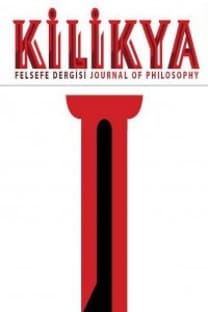Heideggerci Sahih Kendiliğe Giden Yolda Zaman, Varlık ve Aşkınlığın Önemi
Bu çalışmada amaçladığımız şey, Heidegger’in kendilik anlayışını zaman temelinde ortaya koymaktır. Bunu yaparken, Heidegger’in zaman, kendilik, dünya ve Varlık gibi terimlerini ele alıyoruz. Mevcut çalışmada, kaygı, ölüm, celp, özgürlük, aşkınlık, kapalılığı açma kararlılığı ve zamansallık (zaman) gibi kavramlar Dasein’ın sahihliğini (authenticity) aydınlatmada bize gerekli çerçeveyi sunuyor. Hâlihazırda bize sunulmuş bir şey olmaktan ziyade, başarılması gereken bir şey olduğu için, sahih kendiliğe giden yol oldukça çetindir. Dasein bu sahih varoluşunu, yaşamı kendinin kılarak elde edebilir. Bunun için, Varolanların Varlığının anlamı, Dasein’in kavranmasında ilk basamağı oluşturur. Zira, Varlığın anlamı sorusuna cevap verebilecek olan yegâne varlık Dasein’ın kendisidir.
The Significance of Time, Being and Transcendence on the Road to the Heideggerian Authentic Self
This paper attempts to reveal the meaning of Heideggerian self on the basis of time. In the course of this, it examines Heidegger’s following terms: time, the self, the world and Being. In the present paper, the notions of anxiety, death, the call, freedom, transcendence, resolution and temporality (time) constitute a frame for articulating the meaning of the authenticity of Dasein. The road to the authentic self is challenging since it is not something already given; rather, the self is something to be accomplished. Dasein must accomplish it by making life its own. To achieve this, the elaboration of the meaning of “the Being of beings” in the exploration of Dasein must be the first step. For it is Dasein who can give an answer to the question of the meaning of “Being”.
Keywords:
The Self, Time, Authenticity, Being, Transcendence,
___
- Blattner, W. D. (1999). Heidegger's Temporal Idealism. Cambridge: Cambridge University Press.
- Blattner, W. D. (2005). Temporality, in A Companion to Heidegger (H. I. Dreyfus, & M. A. Wrathall, Eds.), (pp. 311-324). Oxford: Blackwell Publishing.
- Descartes, R. (2003). Meditations on First Philosophy in Focus (S. Tweyman, Ed.). New York: Routledge.
- Descartes, R. (2006). A Discourse on the Method (I. Mclean, Trans.). Oxford: Oxford University Press.
- Dostal, R. J. (1993). Time and Phenomenology in Husserl and Heidegger, in The Cambridge Companion to Heidegger (C. B. Guignon, Ed.), (pp. 141-169). New York : Cambridge University Press.
- Dreyfus, H., & Wrathall, M. (2005). Martin Heidegger: An Introduction to His Thought, Work, and Life. in A Companion to Heidegger (H. Dreyfus, & M. Wrathall, Eds.), (pp. 1-15). Oxford: Blackwell Publishing.
- Frede, D. (1993). The Question of Being: Heidegger's Project, in The Cambridge Companion to Heidegger (C. B. Guignon, Ed.), (pp. 42-69). New York: Cambridge University Press.
- Guignon, C. B. (1993). Introduction, in The Cambridge Companion to Heidegger (C. B. Guignon, Ed.), (pp. 1-41). New York: Cambridge University Press.
- Guignon, C. B. (2015). Authenticity and the Question of Being, in Heidegger, Authenticity and the Self: Themes from Division Two of Being and Time (D. McManus, Ed.), (pp. 8-20), New York: Routledge.
- Hall, H. (2003). Intentionality and World: Division I of Being and Time, in The Cambridge Companion to Heidegger (C. B. Guignon Ed.), (pp. 122-140), New York: Cambridge University Press.
- Heidegger, M. (1984). The Basic Problems of Phenomenology (A. Hofstadter, Trans.). Bloomington & Indiana Polis: Indiana University Press.
- Heidegger, M. (1992). The Metaphysical Foundations of Logic (M. Heim, Trans.). Bloomington & Indianapolis: Indiana University Press.
- Heidegger, M. (1997). Kant and the Problem of Metaphysics (R. Taft, Trans.). Bloomington: Indiana University Press.
- Heidegger, M. (2000). Introduction to Metaphysics (G. Fried, & R. Polt, Trans.). New Heaven & London: Yale University Press.
- Heidegger, M. (2001). Being and Time (J. Macquarrie, & E. Robinson, Trans.) Oxford: Blackwell Publisher Ltd.
- Hoffman, P. (1993). Death, Time, History: Division Two of Beimg and Time, in The Cambridge Companion to Heidegger (C. B. Guignon, Ed.), (pp. 195-214), New York: Cambridge University Press.
- Kant, I. (1929). Critique of Pure Reason (N. K. Smith, Trans.). New York: St. Martin's Press.
- Mansbach, A. (1991). Heidegger on the Self, Authenticity and Inauthenticity. The Jerusalem Philosophical Quarterly, 40: 65-91.
- McCumber, J. (2011). Time and Philosophy: A History of Continental Thought. Durham: Acumen Publishing.
- Mclean, I. (2006). Introduction, in R. Descartes, A Discourse on the Method, (pp. vii-lxx). Oxford: Oxford University Press.
- McManus, D. (2015). Intoduction, in Heidegger, Authenticity and the Self: Themes from Division Two of Being and Time (D. McManus (Ed.), (pp. 1-7), New York: Routledge.
- Siegel, J. E. (2005). The Idea of the Self: Thought and Experience in Western Europe since the Seventeenth Century. New York: Cambridge.
- Yayın Aralığı: Yılda 2 Sayı
- Başlangıç: 2014
- Yayıncı: Eray Yağanak
Sayıdaki Diğer Makaleler
Nagel’ın Düşüncesinin Öncüleri: Farrell ve Sprigge
Kapitalist Toplumda Özgürleşme: Georges Bataille Düşüncesinde Vazgeçme ve Harcama Olarak Egemenlik
Yeniçağ’daki Spiritüel Cevher Anlayışına De La Mettrie’nin İtirazı
Kant Felsefesinde Hukuk, Kamusallık ve Yurttaşlık
Phaidon’da Ruhun Ölümsüzlüğü: Karşıtların Döngüselliği Argümanı (70C-72A)
Immanuel Kant’ın Canlı Doğa Sorununa Teleolojik Yaklaşımının İncelenmesi
Bilim Felsefesi Bilim Pratiğinden Ne Öğrenebilir?
Heideggerci Sahih Kendiliğe Giden Yolda Zaman, Varlık ve Aşkınlığın Önemi
